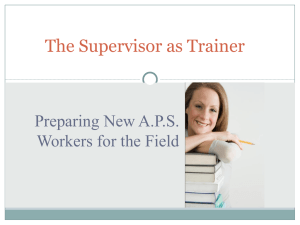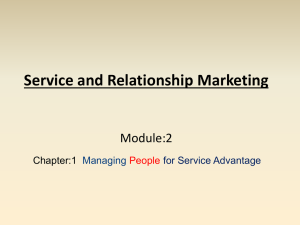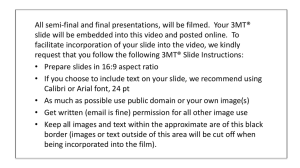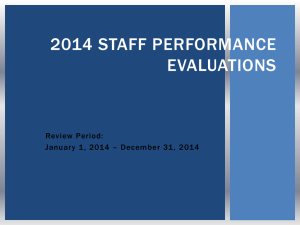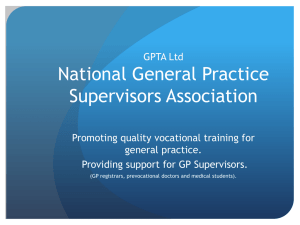Powerpoint
advertisement
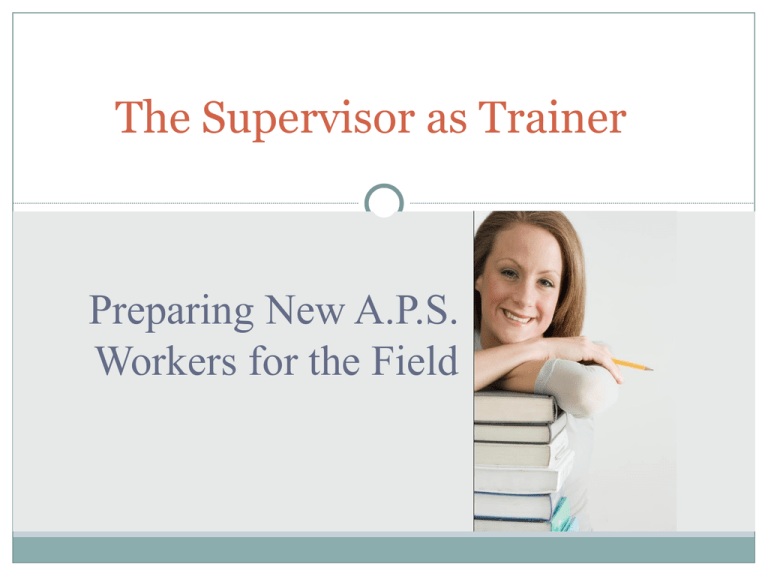
The Supervisor as Trainer Preparing New A.P.S. Workers for the Field Introductions Learning Objectives After participating in this workshop frontline supervisors will gain an understanding of the basic tenets of Kolb's Experiential Learning Theory, and participants will be to articulate the responsibility of the supervisor in promoting effective adult learning when facilitating training of new APS workers. Learning Objectives Participants will be able to assess a new worker's learning style enabling supervisors to provide appropriate and targeted training; participants will be able to correctly apply at least one new training strategy in order to reinforce the NAPSA Core Competency skills. Learning Objectives Frontline supervisors will learn how to implement training techniques such as asking open-ended questions, with the goal of developing critical thinking skills in the new APS Worker. Learning Objectives Frontline supervisors will learn how to utilize two established tools that can be applied in order to evaluate a new APS Worker's integration of the training materials. Learning Objective During the session, frontline supervisors will practice providing supportive, critical feedback so that they may acquire skills enabling them to effectively reflect on a new worker's performance when conducting training. Frontline Supervisor: A Multi-faceted Role Clinical Supervision Frontline Supervisor: A Multi-faceted Role Managing Personnel Issues Frontline Supervisor: A Multi-faceted Role Community Representation Frontline Supervisor: A Multi-faceted Role Role Modeling good work practices Frontline Supervisor: A Multi-faceted Role Providing Back-up Coverage to Workers Frontline Supervisor: A Multi-faceted Role Ensuring compliance with state mandates and county policies Frontline Supervisor: A Multi-faceted Role And… training new workers! Challenges Insufficient Time Lack of experience/expertise with training Lack of training related resources or budget Lack of a standardized/established curriculum Lack of an overall training plan Limited evaluation techniques What do Training Programs Look Like? Structured Non-structured Strict Timeline Supervisor as Trainer Established Curriculum No Timeline VS Peer-to-Peer Training Eclectic Approach What do APS Training Programs Look Like Across the Country? What are the qualities that contribute to a good learning environment? -Student is highly motivated -Student devotes energy to learning. -Learning atmosphere is supportive and rewarding. -Content is presented in a meaningful way. -Supervisor takes into consideration uniqueness of each learner. Adult Learning Theory I hear and I forget I see and I remember I do and I understand Buddhist quote Kolb’s Learning Styles Barriers to Adult Learning Fear of making mistakes Non-relevant materials Lack of participation Fear of change Formal atmosphere What kind of a Trainer are You? APS Training Modalities What teaching tools do you have? Matching worker’s learning style with training method. Case Studies Videos Written Information Brainstorming Critical Incidents Games Shadowing What should we teach new APS workers? Standardized Training contributes to: • Adherence to policy • Consistence • Improved Outcomes • Reduced Liability N.A.P.S.A Core Competencies apsnetwork.org Critical Thinking Skills Teaching Critical Thinking Skills Modeling Focus on Process Look for Themes Has the Worker Learned the Material? Application to job? Impact on client outcomes? Use of Standardized Evaluation Tools Transfer of Learning Exercises WISE Tool WISE (Worker Interview Skills Evaluation)* Assesses investigative/interview skills Direct observation 9 Item Scale Rating on scale of 1-5 Self-assessment Supervisor may use periodically Materials provided by Texas Department of Family and Protective Services, Adult Protective Services Program and Training Division. Permission granted for use 2010 NAPSA Conference. Evaluating APS Trainees Coaching vs. Bossing Elements of an Effective Critique • • • • • Inquiry Generalization Data Theory Demonstration Final Review
